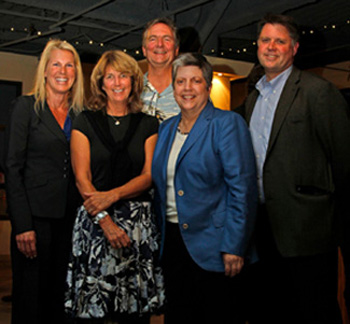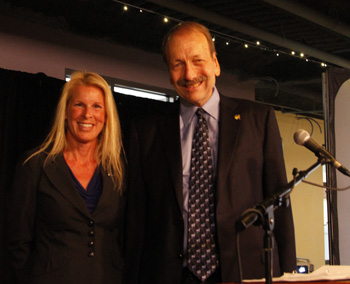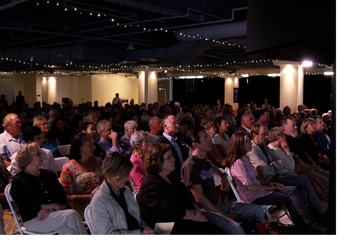An enthusiastic audience of 250 community members gathered at the “Top of the Ritt” in downtown Santa Cruz last night to celebrate UCSC’s very first evening of “Ed Talks”—three TED-style talks by acclaimed UC Santa Cruz faculty.
Co-hosted by UCSC Chancellor George Blumenthal and Santa Cruz Mayor Hilary Bryant, the evening featured presentations by David Haussler, professor of biomolecular engineering; Terrie Williams, professor of ecology and evolutionary biology; and Alan Christy, professor of history.
“This event is a celebration of our deep roots in the community and the fact that our impacts extend locally, regionally, nationally, and globally,” the chancellor noted in his opening introduction.“You’ll hear about some amazing research tonight and about the transformative experience we offer students.”
Mayor Bryant added that “this event was sold-out in 24 hours because this community really appreciates the work and research going on at UCSC and the value of the campus to the community.”
Haussler--a leader in the use of bioinformatics and data science to solve problems in cancer research--opened the program. His talk was titled The Quest to Conquer Cancer: Computer Geeks to the Rescue!
“My message today is that cancer is actually a digital disease,” Haussler began. “And it’s the digital analysis of cancer that will revolutionize the treatment of this disease.”
Haussler collaborates with researchers at medical centers nationwide to discover the molecular causes of cancer and pioneer a new personalized, genomics-based approach to cancer treatment. His team developed the UCSC Cancer Genomics Hub to manage data for all of the National Cancer Institute's major cancer genomics projects-- currently the largest shared cancer genome database in the world.
Terrie Williams followed Haussler with a talk titled Saving Endangered Species: The Story of the Hawaiian Monk Seal.
She noted that fewer than 1,100 Hawaiian monk seals live in the warm waters of Hawaii and that scientists predict this critically endangered species could become extinct within 50 years.
“I want you to think about the amazing opportunity to change the world,” Williams told the audience. “What if you could actually save a species? That’s what we’re trying to do at UCSC.”
Williams is working closely with federal biologists in their efforts to reverse the trend toward extinction. Her research at Long Marine Lab is yielding crucial information about the physiology of Hawaiian monk seals and their needs for survival in a changing environment.
History professor Alan Christy rounded out the presentations with his talk: Humanities Today: The Transformational Power of Student-Centered Learning.
“David is tackling cancer. Terrie is saving the animals. My goal is no less than to bring peace to the world,” Christy began. “People say why study the humanities today? Let me start with some photos to show you why.”
A 2012 recipient of the Dizikes Faculty Teaching Award in Humanities, Christy described an “audacious” project where his students are designing an interactive museum exhibit that they will literally bring to Okinawa, inspired by historical photos that were donated to the UCSC Library’s Special Collections.
“Instead of giving students a textbook or lecturing at them about Okinawan history, I am inviting them to generate their own understanding of history out of primary sources,” said Christy. “They learn that historical thinking is linked to a wide range of professions and activities and that it can impact the world…that they can change the world.”
Prior to the presentations, Chancellor Blumenthal welcomed a special guest in the audience, Janet Napolitano, who was making her first visit to Santa Cruz as the new University of California president. Napolitano toured the campus earlier in the afternoon.





